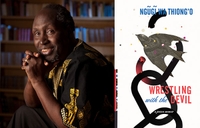Globalectics: Theory and the Politics of Knowing
Ngugi wa Thiong’o. Columbia Univ., $22.50 (112p) ISBN 978-0-231-15950-0
In this knowledgeable exploration of the meaning of global literature and post-colonialism, and their role in shaping minds, Thiong’o (Decolonizing the Mind), a playwright and novelist in exile from his native Kenya, draws on his experience of studying literature in a British-centered curriculum while his country fought for independence. After discovering Marx’s theories of class struggle, he realized how meaningful it could be to view literature through the prism of the colonial experience, as readings of Conrad’s Heart of Darkness show. After joining the English faculty at the University of Nairobi, Thiong’o coauthored a paper calling for the department to change its name to Literature, and for the curriculum to emphasize African literature over British. Examining the works of such authors as Wole Soyinka and Chinua Achebe, he finds that they’ve incorporated themes and ideas from Western literature, while using the traditions in their native cultures as a framework. Writing about the practicalities of teaching world literature, from selecting texts to dismantling the false idea that literature from oral cultures is less worthy of study than that from written ones, he proposes the term “globalectics,” which allows readers to see the connections between works from different time periods and places. In an ever-shrinking world, this book demonstrates the need to understand the similarities and differences in the stories we tell each other. (Jan.)
Details
Reviewed on: 11/28/2011
Genre: Nonfiction
Paperback - 120 pages - 978-0-231-15951-7


